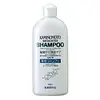What's inside
What's inside
 Key Ingredients
Key Ingredients

 Benefits
Benefits

 Concerns
Concerns

 Ingredients Side-by-side
Ingredients Side-by-side

Glycyrrhetinic Acid
Skin ConditioningPiroctone Olamine
PreservativeDisodium EDTA
Sodium Chloride
MaskingCitric Acid
BufferingSodium Salicylate
PreservativeButylene Glycol
HumectantSodium Laureth Sulfate
CleansingMenthol
MaskingCocamide DEA
EmulsifyingTea-Lauryl Sulfate
CleansingLauryl Betaine
CleansingGlycol Distearate
EmollientIsodon Trichocarpus Extract
MaskingSophora Angustifolia Root Extract
Skin ConditioningPEG-75 Lanolin
EmollientCI 19140
Cosmetic ColorantCamellia Sinensis Leaf Extract
AntimicrobialParfum
MaskingWater
Skin ConditioningGlycyrrhetinic Acid, Piroctone Olamine, Disodium EDTA, Sodium Chloride, Citric Acid, Sodium Salicylate, Butylene Glycol, Sodium Laureth Sulfate, Menthol, Cocamide DEA, Tea-Lauryl Sulfate, Lauryl Betaine, Glycol Distearate, Isodon Trichocarpus Extract, Sophora Angustifolia Root Extract, PEG-75 Lanolin, CI 19140, Camellia Sinensis Leaf Extract, Parfum, Water
Sea Salt
AbrasiveSodium Chloride
MaskingRosmarinus Officinalis Leaf Extract
AntimicrobialWater
Skin ConditioningPinus Densiflora Leaf Extract
AntimicrobialSodium Methyl Cocoyl Taurate
CleansingGlycerin
HumectantCoco-Betaine
CleansingLauryl Betaine
CleansingZingiber Officinale Root Extract
MaskingXanthan Gum
EmulsifyingPropanediol
SolventEthylhexylglycerin
Skin ConditioningRosmarinus Officinalis Leaf Oil
MaskingOcimum Basilicum Leaf Extract
Skin ConditioningOcimum Sanctum Leaf Extract
Skin ConditioningOriganum Vulgare Leaf Extract
Skin ConditioningBifida Ferment Lysate
Skin ConditioningLactobacillus Ferment Lysate
Skin ConditioningCaffeine
Skin ConditioningPanthenol
Skin ConditioningMoringa Oleifera Seed Oil
EmollientMenthol
MaskingSalicylic Acid
MaskingCedrus Atlantica Bark Oil
MaskingAbies Sibirica Oil
MaskingCupressus Sempervirens Oil
MaskingNiacinamide
SmoothingChamomilla Recutita Flower Extract
MaskingVerbena Officinalis Extract
EmollientStyrax Benzoin Resin Extract
MaskingDipropylene Glycol
HumectantLimonene
PerfumingGuar Hydroxypropyltrimonium Chloride
Skin ConditioningMelia Azadirachta Leaf Extract
Skin ConditioningMelia Azadirachta Flower Extract
Skin ConditioningCoccinia Indica Fruit Extract
Skin ConditioningAmber Powder
Solanum Melongena Fruit Extract
Skin ConditioningCurcuma Longa Root Extract
MaskingCorallina Officinalis Extract
Skin ConditioningDisodium EDTA
1,2-Hexanediol
Skin ConditioningSea Salt, Sodium Chloride, Rosmarinus Officinalis Leaf Extract, Water, Pinus Densiflora Leaf Extract, Sodium Methyl Cocoyl Taurate, Glycerin, Coco-Betaine, Lauryl Betaine, Zingiber Officinale Root Extract, Xanthan Gum, Propanediol, Ethylhexylglycerin, Rosmarinus Officinalis Leaf Oil, Ocimum Basilicum Leaf Extract, Ocimum Sanctum Leaf Extract, Origanum Vulgare Leaf Extract, Bifida Ferment Lysate, Lactobacillus Ferment Lysate, Caffeine, Panthenol, Moringa Oleifera Seed Oil, Menthol, Salicylic Acid, Cedrus Atlantica Bark Oil, Abies Sibirica Oil, Cupressus Sempervirens Oil, Niacinamide, Chamomilla Recutita Flower Extract, Verbena Officinalis Extract, Styrax Benzoin Resin Extract, Dipropylene Glycol, Limonene, Guar Hydroxypropyltrimonium Chloride, Melia Azadirachta Leaf Extract, Melia Azadirachta Flower Extract, Coccinia Indica Fruit Extract, Amber Powder, Solanum Melongena Fruit Extract, Curcuma Longa Root Extract, Corallina Officinalis Extract, Disodium EDTA, 1,2-Hexanediol
Ingredients Explained
These ingredients are found in both products.
Ingredients higher up in an ingredient list are typically present in a larger amount.
Disodium EDTA plays a role in making products more stable by aiding other preservatives.
It is a chelating agent, meaning it neutralizes metal ions that may be found in a product.
Disodium EDTA is a salt of edetic acid and is found to be safe in cosmetic ingredients.
Learn more about Disodium EDTALauryl Betaine is a surfactant. It helps cleanse your skin by gathering oil, dirt, and other pollutants to be rinsed away.
Menthol is a compound found in mint plants, such as peppermint. In its pure form, it is a clear crystalline substance.
Menthol is known for its cooling sensation; however, the cooling is actually from your skin being sensitized. Menthol can worsen rosacea. We recommend speaking with a professional if you have concerns.
Menthol also has antimicrobial properties.
Learn more about MentholChances are, you eat sodium chloride every day. Sodium Chloride is also known as table salt.
This ingredient has many purposes in skincare: thickener, emulsifier, and exfoliator.
You'll most likely find this ingredient in cleansers where it is used to create a gel-like texture. As an emulsifier, it also prevents ingredients from separating.
There is much debate on whether this ingredient is comedogenic. The short answer - comedogenic ratings don't tell the whole story. Learn more about comegodenic ratings here.
The concensus about this ingredient causing acne seems to be divided. Research is needed to understand if this ingredient does cause acne.
Scrubs may use salt as the primary exfoliating ingredient.
Learn more about Sodium ChlorideWater. It's the most common cosmetic ingredient of all. You'll usually see it at the top of ingredient lists, meaning that it makes up the largest part of the product.
So why is it so popular? Water most often acts as a solvent - this means that it helps dissolve other ingredients into the formulation.
You'll also recognize water as that liquid we all need to stay alive. If you see this, drink a glass of water. Stay hydrated!
Learn more about Water